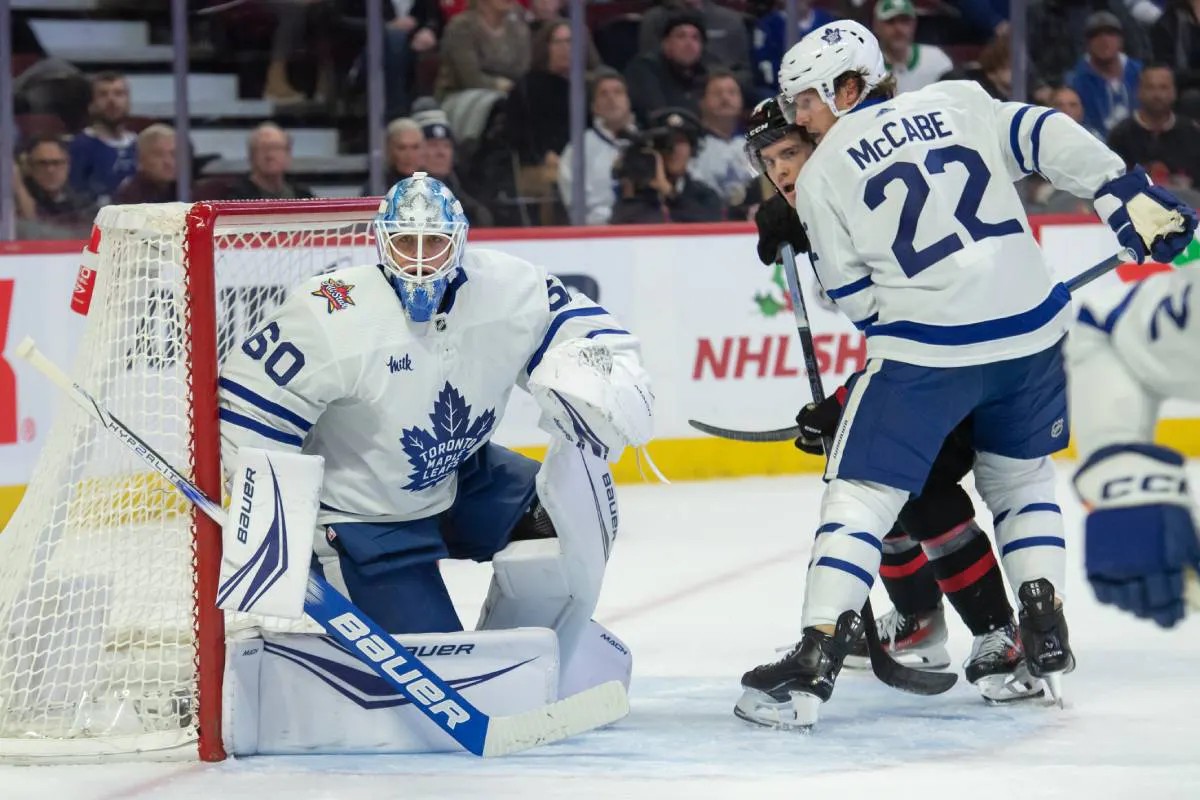The Maple Leafs have rushed to ink a three-year contract extension with Joseph Woll, who, at age 26, has just 39 games of NHL experience.
Joseph Woll extends in Toronto 3 x $3.66M
— Elliotte Friedman (@FriedgeHNIC) July 1, 2024
Woll is signed for one more season at a bargain $766k cap hit and would’ve been an RFA at the end of the deal, meaning the Leafs are buying two UFA seasons with a three-year contract extension.
The reported framework would be similar to that of Woll’s former USA teammate and friend Jake Oettinger in Dallas, who signed Oettinger to a three-year, $4 million contract under a $82.5 million cap back in September of 2022. Unlike Woll, whose career high is 25 NHL games (set in 2023-24), Oettinger broke through earlier in his 20s and was coming off a promising 48-game regular season followed by a very strong seven-game playoff series against Calgary at the time of signing.
With Woll at $3.66 million, it represents 3.98% of a currently projected $92 million cap limit when the new contract kicks in for 2025-26, compared to Oettinger’s 4.85% — so while Oettinger was more proven at the time he inked his deal, Woll comes in cheaper accordingly. Most notably, Oettinger’s $4 million contract bought three RFA seasons, whereas Woll’s buys two UFA years under a rapidly rising cap.
Most assumed the Leafs would evaluate Joseph Woll for the majority of the 2024-25 season before engaging in any serious contract discussions. In other words, they would sign a veteran 1B to support him this summer, re-evaluate his offseason training regimen, and see if he finally takes the step of staying healthy in 2024-25. Brad Treliving rushing to make a three-year commitment to a goalie he maintains the RFA rights on beyond the season is a somewhat surprising development.
On the one hand, there is the obvious talent to bet on and the highly appealing affordability and cost certainty involved in locking Woll down for the next four years of his prime.
With the exception of a fairly short mediocre stretch of play coming off of his long injury layoff this past season — it was a tough injury to return from (a high-ankle sprain) — when Woll is in the net, he’s left little doubt in anyone’s mind about his talent, athleticism, composure, and technical ability. Combined with the revised approach to offseason training that Brad Treliving recently spoke about, there is plenty worth betting on with this netminder.
Multiple times, Woll appeared on the verge of taking over the crease for good this past season with consistently solid performances — before his high-ankle sprain in early December, again when the Leafs gave him every opportunity to pick up the starting reins after he returned nearly three months later, and once again in the playoffs when he stepped in with two excellent performances in the Game 5 and 6 victories (we all know what happened before Game 7 — yet another injury).
And therein lies the rub, clearly. On the flip side of betting on Woll’s talent, Treliving is taking on some additional risk by spending $3.66 million on an inexperienced and injury-prone goaltender, all in the name of hypothetically saving, let’s say, somewhere around $1.5 million on the cap next offseason if Woll were to thrive in the 2024-25 season from a health and performance standpoint. Given the obvious risks, whether the juice will be worth the squeeze remains to be seen.
If a pending RFA Woll were to produce a good and relatively healthy 2024-25 season, probably the worst possible negotiating position Treliving would find himself in is a talking contract with an RFA goalie looking for a medium-term deal in the $5 million range at a time when the cap flexibility could be significant with the expiry of John Tavares and Mitch Marner’s deals. It wouldn’t be the end of the world, and it does eliminate all of the risks if Woll’s 2024-25 season goes south, but obviously, the less proactive approach can mean paying up more should Woll prove himself.
Woll hasn’t hit the 30-game mark in a pro season since his rookie year with the Marlies in 2019-20 — even then, it was just 32 games. Before then, he played a college schedule for three years (30-some-odd games per season). Playing over half the games in an NHL regular season and then carrying the load in the highly intense every-other-night schedule of the NHL playoffs is something Woll has never come close to proving he can endure physically.
As is always the case when a team bets on talent/upside and future performance, only time will tell — especially at the goaltending position. When it comes to a goalie of Woll’s upside and the prospect of locking him down at the cost of $766k->$3.66 million->$3.66 million->$3.66 million for his age 26-29 seasons, the appeal of getting this done early is quite obvious. Fingers crossed that Woll finally stays healthy in 2024-25 while continuing to prove he can be the guy when he is in the net.
Related Reading
Amid buzz about a three-year Joseph Woll contract extension, @AlexDrain_NHL takes a deep dive into the Leafs' options in the UFA and trade markets to find a tandem/backup goalie to pair with Woll 👇 https://t.co/4PIIpPehyy #LeafsForever
— Maple Leafs Hotstove (@LeafsNews) June 24, 2024















![John Gruden after the Leafs prospects’ 4-1 win over Montreal: “[Vyacheslav Peksa] looked really comfortable in the net… We wouldn’t have won without him” John Gruden, head coach of the Toronto Marlies](https://mapleleafshotstove.com/wp-content/uploads/2025/09/gruden-post-game-sep-14-218x150.jpg)


















